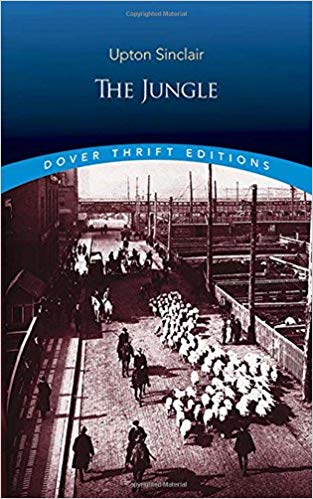
Armchair travel around the world!
Start your reading adventures with our FREE Reading Atlas.

- Around the World in 14 Books
- 7 Thrilling Book Series
- 6 Audiobooks That Are Like Theater For Your Ears



This muckraking classic (334 pages) was published in November of 2005 by Dover Publications. The book takes you to turn-of-the-century Chicago. Melissa read The Jungle and loved it; it wouldn't be on our site if she didn't recommend it.
Bookshop.org is an online bookstore with a mission to financially support independent bookstores and give back to the book community.

Welcome to Chicago of 1904. It’s the land of opportunity if you already happen to be rich. It’s also the epicenter for America’s melting pot, a new home for immigrants from Europe who are eager for a better life and willing to work hard to earn it.
When the story opens at a wedding celebration in Packington, Chicago. For the young, bright-eyed Lithuanian couple — Jurgis and Ona — it seems that the promise of America will come true. But as their story unfolds, the hope and optimism of their extended family erode in a way that’s as heartbreaking as it is unsurprising.
Drawn by the promise of well-paid work, Jurgis and his family of aunts, uncles, and cousins have emigrated to work in the booming stockyards and meatpacking plants of Chicago. They pool their money to buy a house and obediently submit to inhumane working conditions. But soon, they’re struggling under house payments they didn’t fully understand and suffering at the whims of their skinflint employers.
Author Upton Sinclair went undercover for seven weeks to research the working conditions of the industry that literally fed the country at the time. He wrote this book as an exposé of the appalling experience for factory workers, but the reading public reacted most strongly to the unsanitary practices of the meat butchering process. ‘I aimed at the public’s heart,’ Sinclair said, ‘and by accident, I hit them in the stomach.’ His expose and the ensuing public outcry lead to two pieces of federal legislation: the Food and Drug Act and the Meat Inspection Act of 1906.
This is a scathing exploration of unbridled capitalism, corruption, and exploitation by the powerful of the powerless. Its graphic descriptions of human suffering — and the brutal conditions on the floors of the meatpacking plants — make it a difficult read. But more than 100 years since its publication, it is, sadly, entirely too relevant.
The great packing machine ground on remorselessly, without thinking of green fields; and the men and women and children who were part of it never saw any green thing, not even a flower. Four or five miles to the east of them lay the blue waters of Lake Michigan; but for all the good it did them it might have been as far away as the Pacific Ocean. They had only Sundays, and then they were too tired to walk. They were tied to the great packing machine, and tied to it for life. — Upton Sinclair
Wanna help us spread the word? If you like this page, please share with your friends.
Strong Sense of Place is a website and podcast dedicated to literary travel and books we love. Reading good books increases empathy. Empathy is good for all of us and the amazing world we inhabit.
Strong Sense of Place is a listener-supported podcast. If you like the work we do, you can help make it happen by joining our Patreon! That'll unlock bonus content for you, too — including Mel's secret book reviews and Dave's behind-the-scenes notes for the latest Two Truths and a Lie.
Join our Substack to get our FREE newsletter with podcast updates and behind-the-scenes info — and join in fun chats about books and travel with other lovely readers.

We'll share enough detail to help you decide if a book is for you, but we'll never ruin plot twists or give away the ending.
Content on this site is ©2026 by Smudge Publishing, unless otherwise noted. Peace be with you, person who reads the small type.